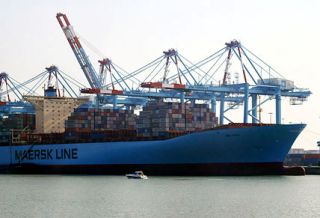 A number of member-container lines in the Transpacific Stabilization Agreement (TSA) operating between the U.S. and Asia plan to implement congestion charges for cargo moving via U.S. West Coast ports in response to labor-related terminal delays.
A number of member-container lines in the Transpacific Stabilization Agreement (TSA) operating between the U.S. and Asia plan to implement congestion charges for cargo moving via U.S. West Coast ports in response to labor-related terminal delays.
The charges of up to US$1,000 per 40-foot container (FEU) take effect on November 17, 2014.
TSA said in a November 14 statement that earlier this year shipping lines individually published congestion charges specifically to cover labor-related service disruptions. Beginning November 17 carriers will assess and collect their respective charges on an individual basis for eastbound and westbound cargo.
It noted reports by terminal operators at Seattle and Tacoma of 40% to 60% productivity reductions in loading and discharge of vessels that threaten to disrupt schedules and delay receipt and delivery of cargo to a regional economy highly dependent on waterborne international trade.
In Southern California, 14 ships were at anchor in Los Angeles-Long Beach harbor awaiting a berth, and cargo-handling operations fell to a low of 11 containers per hour. Increased longshore container and chassis safety inspections have contributed to average truck turn times of 2-3 hours at terminal gates and yards. Oakland terminals have reported work slowdowns and disruptions involving equipment operators.
“Carriers are mindful of the potential impacts of added charges on their customers and are monitoring the situation closely,” said TSA executive administrator Brian Conrad. “They would clearly rather not impose the charges, but are concerned that disruptions can escalate quickly across their networks, at significant cost, if they fail to respond quickly.”
TSA said a survey of member-line costs associated with service interruptions and delays to date revealed that lines are now incurring losses and expenses due to blanked sailings, skipped port calls, and speedup of existing vessels or chartering of added ships and equipment to maintain schedules.
Extraordinary shoreside costs include container detention and storage charges, additional longshore gangs and associated overtime, extended gate hours and fees, tug services, and increased trucking charges relating to inter-terminal transfers.
To the extent that backups continue, impacts will likely be felt across carrier networks in Asia, as cargo and equipment are rolled to later sailings, said the group.
TSA is a research and discussion forum of major container shipping lines serving the trade from Asia to ports and inland points in the U.S. These carriers include APL, China Shipping Container Lines, CMA-CGM, COSCO Container Lines, Evergreen Line, Hanjin Shipping Co., Hapag-Lloyd, Hyundai Merchant Marine, Kawasaki Kisen Kaisha, Maersk Line, Mediterranean Shipping Co., Nippon Yusen Kaisha, Orient Overseas Container Line, Yangming Marine Transport, and Zim Integrated Shipping Services.
Photo: Hans Hillewaert




